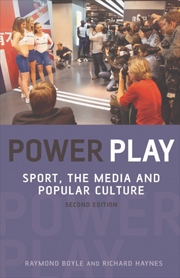Book contents
- Frontmatter
- Contents
- Miscellaneous Frontmatter
- Preface
- Acknowledgements
- 1 Sport, the Media and Popular Culture
- 2 All Our Yesterdays: A History of Media Sport
- 3 A Sporting Triangle: Television, Sport and Sponsorship
- 4 Power Game: Why Sport Matters to Television
- 5 Who Wants to Be a Millionaire? Media Sport and Stardom
- 6 The Race Game: Media Sport, Race and Ethnicity
- 7 Playing the Game: Media Sport and Gender
- 8 Games Across Frontiers: Mediated Sport and National Identity
- 9 The Sports Pages: Journalism and Sport
- 10 Consuming Sport: Fans, Fandom and the Audience
- 11 Conclusion: Sport in the Digital Age
- Bibliography
- Index
9 - The Sports Pages: Journalism and Sport
Published online by Cambridge University Press: 05 August 2013
- Frontmatter
- Contents
- Miscellaneous Frontmatter
- Preface
- Acknowledgements
- 1 Sport, the Media and Popular Culture
- 2 All Our Yesterdays: A History of Media Sport
- 3 A Sporting Triangle: Television, Sport and Sponsorship
- 4 Power Game: Why Sport Matters to Television
- 5 Who Wants to Be a Millionaire? Media Sport and Stardom
- 6 The Race Game: Media Sport, Race and Ethnicity
- 7 Playing the Game: Media Sport and Gender
- 8 Games Across Frontiers: Mediated Sport and National Identity
- 9 The Sports Pages: Journalism and Sport
- 10 Consuming Sport: Fans, Fandom and the Audience
- 11 Conclusion: Sport in the Digital Age
- Bibliography
- Index
Summary
After more than thirty years of writing on sport it is still possible to be assailed by doubts about whether it really is a proper job for a grown person. But I console myself with the thought that it is easier to find a kind of truth in sport than it is, for example, in the activities covered by political or economic journalists. Sports truth may be simplistic but it's not negligible.
(Hugh McIlvanney, sportswriter, Arena, BBC TV, 1991)Murdoch tells WSJ execs: ‘Shorter stories, more sport’.
(Headline of news report on Rupert Murdoch's first meeting with Wall Street Journal bureau chiefs, Press Gazette, 17 January 2008)Introduction
Despite living in a highly visual media culture, the print media remain an important source of information, gossip and insight for the sports fan. Reading about sport remains a pleasure for millions of newspaper readers and during the last decade or so, as media sport has expanded, so to has the interest in sport among newspaper editors keen to find a new audience. This chapter examines how sports journalism is changing in the age of digital media. As the political, economic and cultural importance of the sports industries continues to increase it asks how has journalism reacted to this new environment? It is also interested in outlining some of the key challenges faced by those working in those communications industries associated with journalism and sport. For example, how is the rise of online journalism changing existing print and broadcast sports journalism practice and to what extent is the increasing 24/7 media news agenda altering the nature of journalism about sports?
- Type
- Chapter
- Information
- Power PlaySport, the Media and Popular Culture, pp. 164 - 183Publisher: Edinburgh University PressPrint publication year: 2009



